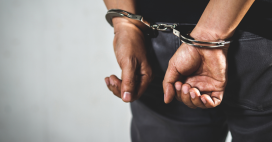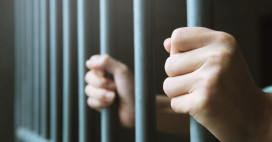
Emmanuel, a Sierra Leone national, flew to Belgium via China at the end of 2016. Upon his arrival in Brussels, he claimed asylum and was placed in the Caricole centre, which normally hosts migrants who were refused access to the Belgian territory upon their arrival at the airport. Emmanuel’s asylum request was refused.
In February 2017, Emmanuel was subjected to his first return attempt to Beijing, China. As allowed by law in first return attempts, he refused to embark the plane and was brought back to the Caricole centre. This was only the first of several return attempts to both China and Sierra Leone.
On 21st March, Emmanuel was subjected to another return attempt to China, a country which had already refused him access during a previous return operation. On that day, Emmanuel was brought to the Brussels airport early in the morning and locked in a police cell at the airport. The agents handcuffed him behind his back, bound his arms with a black strap, and applied tape around his knees and ankles. Completely immobilised, he fell to the ground and was beaten by the agents. One of them twisted his neck and pressed his hand on his mouth. Emmanuel felt like he was going to choke.
From the police cell, he was later transported to a van with 14 police agents, which were supposed to accompany him to the airplane. Inside the van, he was thrown to the floor. The police agents kicked him and pressed their boots on his body. Another police agent twisted his neck and pressed his elbow on it. As a result of the violence, his body was bleeding in several parts and was covered with sweat.
When the van reached the airplane, the agents tried to take Emmanuel onboard. But seeing the state in which he was, the aircrew refused to embark him. Emmanuel was once again brought back to the closed centre.
Two days after the incident, Emmanuel was visited by two external doctors who documented a lesion on his left elbow and severe muscle pain in the neck, cervical, and lumbar regions. The doctors further declared that the patient was both physically and psychologically traumatised. He was also visited by the local NGO Ligue des Droits Humains. They reported that Emmanuel was struggling to walk and sit down because of the pain. His face hurt and was visibly swollen on one side. Blood crusts were visible on one of his wrists.
Emmanuel’s lawyer introduced a complaint to the public prosecutor in Vilvoorde to the Comité P (a public organism which is supposed to control police practices) and to the Federal Mediator. Before the case was concluded, Emmanuel was returned to Sierra Leone. Emmanuel’s lawyer only got to know about his return through a blog post from the then Minister of Asylum and Migration Theo Francken on his personal website.
The public prosecutor opened an internal investigation into the case but found no offence. The complaint was finally dismissed after Emmanuel’s return to Sierra Leone.
The Comité P also dismissed the complaint based on a) the prosecution dismissal and b) the fact that Emmanuel had been returned to Sierra Leone in the meantime.
No complaint was introduced to the investigative judge as the procedure costs €125 and it is very cumbersome for the lawyer to prove that their client is indigent and therefore eligible to legal aid.
The Federal Mediator had visited the Caricole closed centre at the end of March 2017, before Emmanuel’s return, and had met with him, his social assistant, one nurse, and the centre’s co-director to gather relevant information on the case.
The Mediator’s research was sent to the complainant in July 2018. It confirmed that Emmanuel’s wounds were due to the use of violence by the police but did not conclude to a disproportionate use thereof. Instead, the Mediator forwarded the complaint to the Comité P, which was dismissed just like the complaint filed by Emmanuel’s lawyer.
The Mediator’s research concluded that Emmanuel’s return attempt towards Beijing was unreasonable given the previous refusal of the Chinese authorities to grant him access, and that a remedy was in any event no longer possible.


